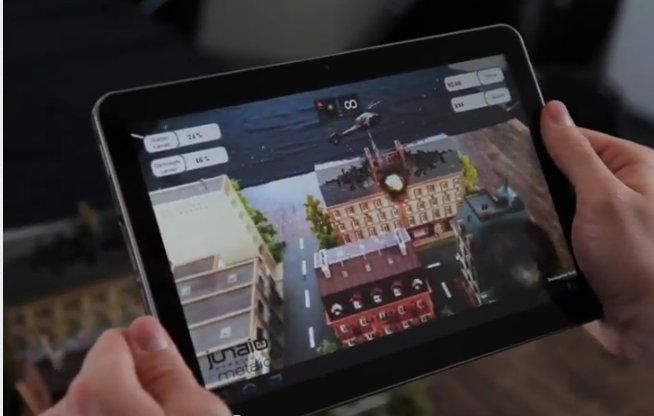Metaio has unveiled plans to add 3D Object Tracking and Visual Search to its free mobile Augmented Reality SDK for Android and iOS, part of the Augmented City platform.

This SDK is optimized by major ARM chipset providers, and assembles technologies necessary for creating interactive and immersive AR experiences, such as the overlay of virtual information on building facades, city streets and almost any 3D real world object or device, says the company.
Metaio Mobile SDK is specifically optimized for Texas Instruments OMAP4460/4470 and ST Ericsson NovaThor processors using respectively PowerVR SGX540, SGX544 and Mali-400 GPUs.
The metaio Augmented City platform consists of diverse mobile and web software packages that use computer vision technology to insert 3D and digital information into the real world. Whereas many existing Augmented Reality (AR) platforms limit experiences to GPS mapping and the anchoring of graphics to simple, 2D surfaces, metaio platform can deliver real-time tracking and recognition of 3D objects as well as a client-based Visual Search.
Metaio has also thought about publisher and offers 2 new technologies to make AR content production easier and more cost-effective:
- The Augmented Reality Experience Language (AREL) will expand development opportunities by bringing HTML5 and JavasScript to mobile AR experiences.
- metaio Creator – Content authoring tool that will allow developers to publish AR experiences to mobile, web or browser clients.
You can watch the interview with Peter Meier, CTO of metaio as well as see the Augmented City Platform in action in the video below. You can even play a virtual “terrorist” by blowing up buildings in your virtual city by a simple touch.
Metaio Mobile SDK version 3.1 WITH support for 3D Object Tracking will be available for download free of charge on Metaio Website on March 14, 2012 .
Metaio will showcase the platform at Mobile World Congress 2012, in Barcelona, 27 Feb – 1 March.
If you do not want to wait, you can always download metaio Mobile SDK 3.0 released in December 2011.

Jean-Luc started CNX Software in 2010 as a part-time endeavor, before quitting his job as a software engineering manager, and starting to write daily news, and reviews full time later in 2011.
Support CNX Software! Donate via cryptocurrencies, become a Patron on Patreon, or purchase goods on Amazon or Aliexpress




